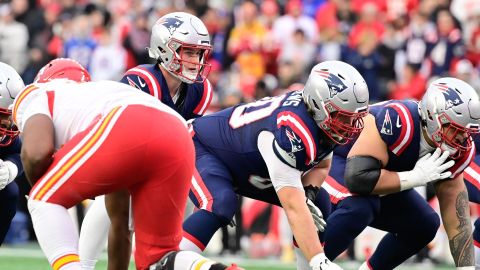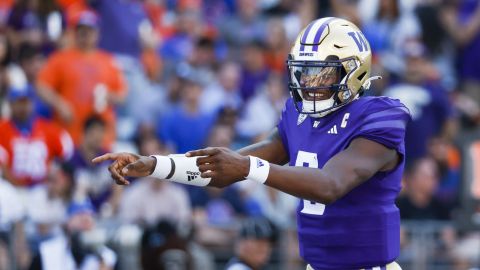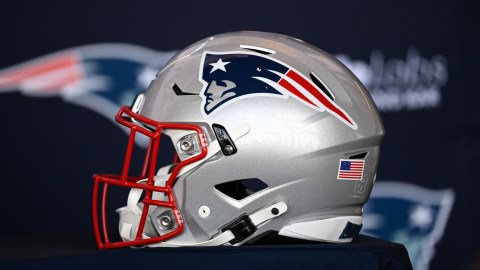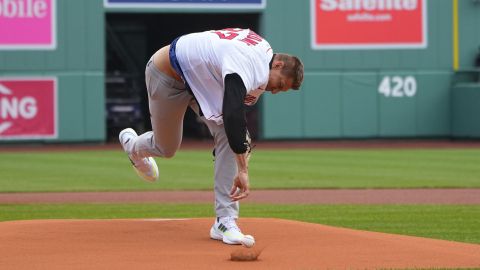FOXBORO, Mass. — No matter how much the NFL preaches about quarterback safety, the league’s defensive players are going to fight back over a diminishing sense of freedom on the field.
They understand the importance of keeping the league’s marquee names upright and healthy, but they don’t have to like it. Two Patriots — defensive end Andre Carter and linebacker Rob Ninkovich — have been flagged for questionable hits on quarterbacks in the last two weeks. Carter was also fined $15,000 for his contact with San Diego’s Philip Rivers.
Ninkovich wants the league and its officials to have more discrepancy with the flags and fines.
“I know they want to protect the quarterbacks, which is completely understandable,” Ninkovich said. “But there are certain situations where there are different degrees of intensity on the hits that are all treated the same, which is a little hard to comprehend a full-speed collision rather than something that is not very damaging to somebody. I think the league is just trying to get their point across that there is zero tolerance on the quarterbacks.”
The newfound drive to keep quarterbacks clean has led to some confusing penalties. However, as brutally atrocious as some of the calls have looked, officials have at least maintained a degree of consistency. It’s not a perfect level of consistency, and it might not make it a popular ruling with the players, but they at least know that players on other teams are dealing with the same issues.
Ninkovich, for one, took exception to the flag that came from his hit on Bills quarterback Ryan Fitzpatrick.
“I know there are more involved rules with how and where you touch the quarterback, but on that particular play, I was actually trying to stop myself from hitting the quarterback,” Ninkovich said. “It’s a tough one. So you’ve got to deal with whatever the league comes down with and take it.”
Sometimes, it can be physically impossible to avoid that type of contact. After running hard and working to fight through a block, defensive players have a difficult time slowing down before making the hit. Carter touched on that point when reflecting on his hit.
“You’re trained,” Carter said. “They always say, ‘[If] there’s an opening, you go ahead and take it.’ You kind of reflect on it and say, ‘OK, well maybe if my head was on the right side, maybe if it was on the left side.’ There’s no way of doing it. The only way I can think of is just pulling up. When you go to the quarterback in kind of that no-man’s land, you’ve got to take a shot. It wasn’t necessarily dirty, but that’s what defensive ends or defensive players thrive off of, especially when it comes to harassing the quarterback and getting that pressure. That’s how I look at it.”
Players realize the NFL has done a better job to remove hits on defenseless receivers, though that is also still a work in progress. Some of those hits can be extremely vicious, but there are times when the officials go too far with the flag.
While consistency isn’t as much of an issue with hits on quarterbacks, it’s been a guessing game with the hits on defenseless receivers. Patriots wide receiver Wes Welker draws as many whacks as anyone, and he drew a questionable personal foul penalty on Bills safety Jairus Byrd, who hit Welker in the head after the receiver made his move and ducked into the hit.
Is the NFL getting soft? Well, it depends who is asked. Current defensive players aren’t thrilled because they’re getting fined more often — or, at least, for hits that wouldn’t have drawn fines a few years ago. And a lot of former defensive players speak out against the way that game has changed in that aspect.
Take another perspective, though. Hall of Fame cornerback Mike Haynes, who played for the Patriots from 1976-82, was a close friend and teammate of Patriots wide receiver Darryl Stingley, who was paralyzed by a malicious hit from Oakland’s Jack Tatum during a 1978 preseason game. Stingley died in 2007 due to complications from quadriplegia.
Haynes knew the game was different back then, and intimidation played a huge factor in the defensive formula. It was a necessary evil, but his perspective changed once he saw first-hand how one hit could derail a person’s life.
“In that era, there were a lot of guys that played with the intent to hurt someone,” Haynes told NESN.com last year. “That one incident may be one that changed football. I can tell you that hit impacted a lot of defensive players because all of us were trying to make hits when the [receiver] was in the air. We knew that he couldn’t catch the ball. We were trying to send a message, ‘Hey, next time, we’re going to be there, so you want to think twice about it.’ But I don’t think anyone ever really would have thought that we could have that kind of impact on someone.”
Haynes doesn’t think the game has gotten softer, just safer. At the end of the day, it’s probably for the best.
“The game is a lot safer now, and you don’t see guys trying to make hits like that anymore,” Haynes said. “The commissioner (Roger Goodell) has done just a fantastic job of making the game safer. You can keep going back, head slaps, all those things were legal [in Haynes’ era]. But it’s become safer and safer, and kudos to the football operations department and the commissioner for working really hard to try to make it even safer. I don’t think we’re there yet. I think we can still get safer with better equipment and things like that. Some of the new things in terms of how much hitting goes on on the field, what to do if a player is concussed, or if a player has a severe injury, how you’re not leaving it up to the player to make that decision to go back in. Of course a player is going to say, ‘Yeah, I’m fine. I’m going back in.’ We know now that is not the right decision, and the league is taking steps to make sure that things that happened in the past won’t happen in the future.”



